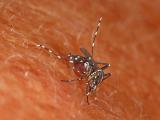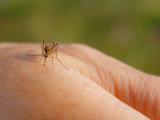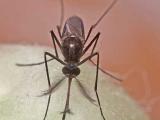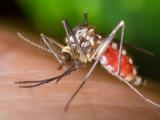Oct 23, 2003 (CIDRAP News) – Some Wisconsin farm workers who had West Nile virus (WNV) infection might have caught the virus from turkeys rather from mosquitoes, according to the Centers for Disease Control and Prevention (CDC).
Most WNV infections in humans come from mosquitoes, which initially acquire the virus by biting infected birds. But 10 workers at a Wisconsin turkey farm might have contracted the virus from contact with turkey feces, the CDC reports in the Oct 24 Morbidity and Mortality Weekly Report.
Two workers at the turkey farm ("farm A") were found to have WNV infection in November 2002, according to the report. The workers were concerned about a possible connection between their cases and a fowl pox outbreak among turkeys at the farm the previous September. In Feburary 2003, county and state health officials began an investigation that included a questionnaire and serum sampling among workers at farm A, several other turkey farms in the vicinity, workers at a local turkey processing plant, and residents near farm A.
Of 107 participants in the survey, 10 were found to have WNV-specific IgM antibody, the report says. Eight of these worked at farm A, and the other two worked at other turkey farms in the area. Six of the 10 IgM-positive workers reported having had febrile headaches in late September, whereas only 7 of 97 IgM-negative persons reported having those symptoms any time from August through October. The six workers who reported headaches also reported a skin rash, and one had been hospitalized with meningoencephalitis.
In January 2003, investigators tested serum samples from turkeys at farm A and a neighboring farm. Of 135 female turkeys from farm A (where female and male turkeys were confined separately), 130 (96%) had WNV-neutralizing antibody. No WNV-neutralizing antibody was found in 135 female turkeys from the nearby farm or in 30 male turkeys tested from either farm.
The report says the path of WNV transmission to the farm workers is unknown, but it might have been other than the typical mosquito-borne route. The possibilities include exposure of broken skin or mucous membranes to infected turkey feces or material from "dually infected pox lesions," fecal-oral transmission, and respiratory exposure to aerosolized turkey feces, the report says. The article also notes that WNV, once introduced by mosquitoes, might have spread among the farm A turkeys by a nonmosquito route, such as fecal-oral or respiratory.
Because the means of transmission in the outbreak is unclear, turkey farm workers should take precautions against WNV, the CDC says. These should include wearing protective clothing, using mosquito repellent, wearing gloves, and washing hands often. Investigation of turkey farm workers in the area of farm A is continuing, the agency says.
CDC. West Nile virus infection among turkey breeder farm workers—Wisconsin, 2002. MMWR 2003 Oct 24;52(42):1017-9 [Full text]




















